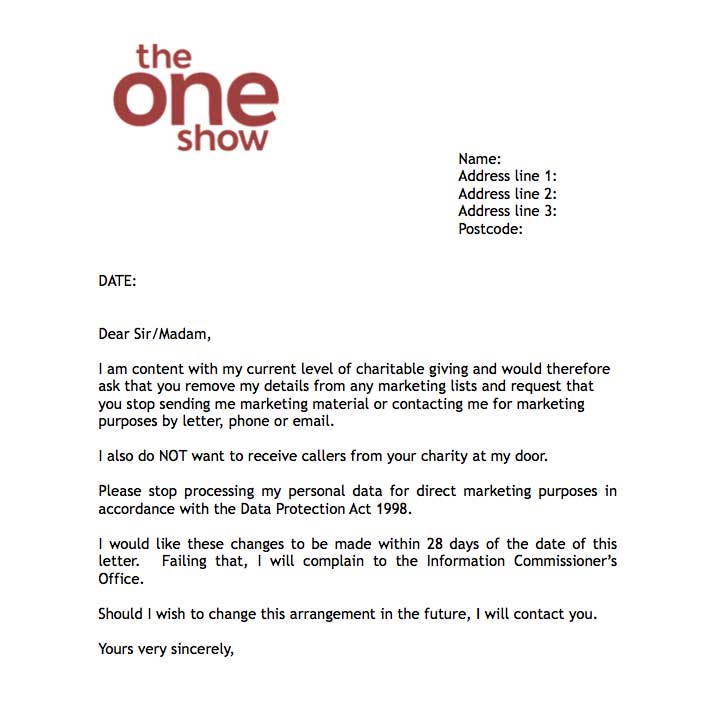BBC’s The One Show offers ‘don’t contact me’ letter to charities for download
The One Show on BBC One has published a template letter for viewers to download and send to any charity that they no longer wish to be contacted by. In the three days since it was published, it has been downloaded more than 18,000 times, according to the programme’s presenter Alex Jones last night.
The template letter was published in the wake of some newspapers’ attempts to link the death of poppy seller Olive Cooke to the volume of appeals by post and telephone made by some charities. The link was denied by Mrs Cooke’s family.
The letter, also available via post using a stamped address enveloped to The One Show, asks that the recipient charity stops contacting or communicating with the recipient for marketing purposes by letter, phone, email or at their doorstep.
It gives the charity 28 days in which to comply, otherwise the sender will complain to the Information Commissioner’s Office.

The One Show aims to help recipients stop receiving unwanted charity marketing communications.
The One Show covered the issue of how charity fundraisers communicate with some donors on Monday’s edition. It looked at how, as presenter Matt Baker described it, “some charities have been using aggressive tactics to get us to part with our cash”.
Angela Rippon and Daphne Clark, the show’s “consumer crusader”, investigated the issue. Between them they “devised [their] own plan to try to stem this rising tide of charity mailshots”. Their solution – a clear, firm request by letter.
Getting the wording right
They took advice on what to include in the wording from regulators the Fundraising Standards Board and the Information Commissioner’s Office, and from the Direct Marketing Association.
However, “10 leading charities, all household names” who were invited to take part in the letter writing project declined to do so, according to Ms Rippon. On the other hand, both Citizens Advice and The Consumer Association did help.
The Cabinet Office was also “happy” with the resultant letter too.
Fundraising Standards Board CEO Alistair McLean was interviewed on 27 May and described the current focus on fundraising communication as “a real watershed for the sector”. He appeared again on Monday’s edition to provide an update on what the sector had done since then. He reported that the Institute of Fundraising had already accepted three of the recommendations and had set up task groups to focus on the remaining recommendations.
He mentioned the recommendation that charity communications should have a clear, standardised opt out box, which he thought would help solve Daphne Clark’s problem.
Journalist Lucy Siegle introduced the letter and explained that it was now available to anyone to download and use. She had contacted several charities earlier to seek their reaction to the letter but had found reticence among some.
One who did comment was the Director of Fundraising at Scope who said that the charity wanted people “to be inspired into giving, not pressurised”. Others said that they hoped for a considered approach “that would fix things in the long term”.
Advertisement



